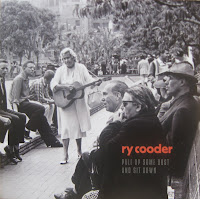Remember the Who’s hardnose heyday and Roger Daltry raging, “Hope I die before I get old”? Never imagined I’d ever have to admit such a sea-change, but the older I get, the farther I drift from Rock and the nearer I draw to Folk (or, in current terminology, Roots/Americana). Only the Guthrie/Dylan/Springsteen-styled Populist mergers keep me hangin' on and around the Rock scene at all. (Happy to admit I haven’t looked at a Rolling Stone issue in years!)
So here are a half-dozen Folk/Roots (&Beyond) CD releases, both new and older, that I’ve heard and enjoyed in recent weeks (and you can play spot-the-connections if you choose):
Purpose + Grace (Topic). Pride of place goes to our guest from across the Pond, Martin Simpson. Back in Old Blighty after several years’ residency in the U.S., Simpson plays a Blues-infused, Anglo-AND-American Folk now, his guitar work smooth and Root-solid, often surprising, occasionally sensational. His own vocals keep improving too, but for this eclectic set, he brought in some big guns: June Tabor, Dick Gaughan, Richard Thompson. And the tunes are terrific, ranging from antique (“The Sheffield Apprentice” and “Barbry Allen”) to Americana (great expanded versions of “In the Pines” and “Little Liza Jane”), from updated (“Bad Girl’s Lament” and “Jamie Foyers”) to current (“Brothers Under the Bridge” and “Strange Affair”). Still, the disc’s apex is reached--and the album’s title secured--when Martin and “Geordie” Gaughan team up for Depression-anthem-come-‘round-again “Brother Can You Spare a Dime.” Anthemic and--think English slang now--brilliant.
Pull Up Some Dust and Sit Down (Nonesuch). Ry Cooder’s new albumchannels Woody Guthrie to offer Ry’s trenchant musical response to the New Depression and never-ending political chicanery--played as only slide-master Cooder can so casually emulate—with angry laments against Wall Street, the wars abroad, old folks cheated, families splintered, returning veterans neglected, a modern Jesse James (Tex-Mex corrida style), and other on-going Populist complaints. It’s a wry Cooder keeper, blending Blues, Old Time Country, Gospel, Folk Ballads, and other Roots-in-Americana; and his National steel guitar might rightly sport a sticker updating the well-known phrase on Guthrie’s: “This machine crushes banksters and warmongering profiteers.”
Note of Hope (429 Records). Opening salvo in the big build-up to the 2012 Guthrie centennial. Unfortunately there’s less meat and more aimless motion in this collection of unknown Woody texts nesting in new musical settings. The whole first half of the CD just limps along, but then Kurt Elling’s boogie and Ani DiFranco’s mechanized “Voice” auger some better; Pete Seegar and Studs Terkel (the one prodded awake and the other resurrected via tape) rouse ‘n’ roll the bindle on down the line; and Chris Whitley (high and lonesome some weeks before he died) and Jackson Browne, rumblin’ and rattlin’ for a fanciful 14-minute “You Know the Night” (Woody busily courting his second wife)… well, de Gents and DiFrank Lady do just manage to take ‘er on home after all.
Wonder Wheel (Jewish Music Group). The Klezmatics had Guthrie Estate approval to adapt some of his Coney Island-era writings to klezmer music… not a totally off-kilter stretch since the folk-poet’s second wife Marjorie (mother of Arlo and Nora plus two) was Jewish. But the result, while sung splendidly and played with an ear attuned to stately (rather than spirited) dance, seems to me a waste of Woody. The klezmer arrangements just overwhelm the Okie from Okemah, rendering his posthumous contributions surprisingly unraucous. Klezmatics fans should sample “Mermaid’s Avenue” (the only Woody lyrics offering his usual evocative sense of place), “Gonna Get through This World,” “From Here On In,” and “Wheel of Life” (Rabbi Woody, would you believe?), while the goyisch Guthrie gang must settle for his less earthy, more spiritual writings: “Holy Ground,” “Orange Blossom Ring,” and “Heaven.”
World Musette (Paris Jazz Corner). Klezmer clarinets, saxes, and fiddles show up sometimes in the wonderful French music called musette—bluesy and triste (sad) but somehow lightly so--which more commonly features accordion and guitar (and violin bien sur). The ever-changing ensemble known as Les Primitifs du Futur took a broader approach for this disc, incorporating xylophone, Hawaiian steel guitar, trumpet, oud, and whatever else might be needed to create a many-nations, World Music version of musette. Present too for many of the tracks, adding banjo, mandolin, and some vocals (plus artwork for the elaborate CD booklet, itself worth the price of the disc), is U.S. expatriate Robert Crumb, better known as cartoonist R. Crumb, professional artist and amateur musician--as opposed to amateur artist and professional musician W. Guthrie, but both men shaped by the Depression (one way or another) and each eventually emblematic of his time. All that aside, this album is strangely effective, a potpourri of varied sounds and styles, China to America, that still links back to the Parisian clubs and Buenos Aires dives that musette evokes.
There’s More Pretty Girls Than One (Arhoolie). Both Crumb and fiddler Ian McCamy appeared on World Musette; now, a decade later, comes McCamy's Melody Sheiks, a cheery quartet of expats residing in Provence and gleefully making Old Timey music together—tight and in tune, but no threat to the master pickers on either side of the Atlantic. And so what? With this repertoire, all the Sheiks need is a suit and a smile:
“Drunken Hiccups” and “Goodbye Booze,” “Ragtime Annie” and “Old Molly Hare,” both the “Dill Pickle” and “Pig Ankle” rags, the “Quebec Quickstep” and “Saint Jobe’s Waltz,” “Take Me Back to Georgia” and “Home Sweet Home.” Hot times in the Old Country, thanks to Crumb’s great collection of Twenties 78s, and a hell of a ways from the "New Country" we know and leave, gladly, behind! So rise up, Billy, and walk along, John, and sail away, ladies, sail away...
Catch ya on the other side.












No comments:
Post a Comment